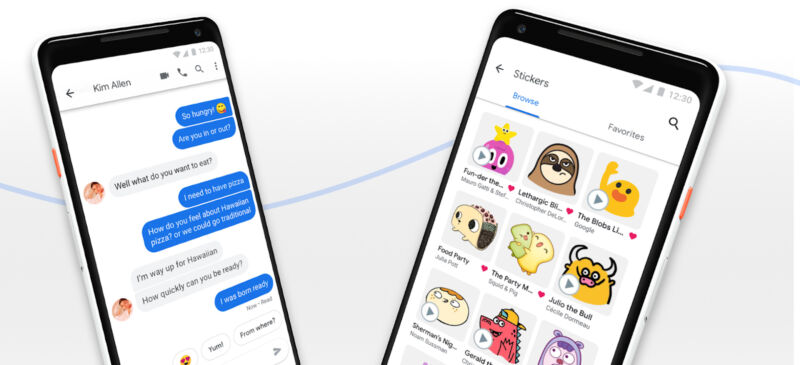

Verizon, AT&T, and T-Mobile kill their cross-carrier RCS messaging plans
source link: https://arstechnica.com/gadgets/2021/04/verizon-att-and-t-mobile-kill-their-cross-carrier-rcs-messaging-plans/
Go to the source link to view the article. You can view the picture content, updated content and better typesetting reading experience. If the link is broken, please click the button below to view the snapshot at that time.
Surely, RCS will take off this time! —
Verizon, AT&T, and T-Mobile kill their cross-carrier RCS messaging plans
Carriers reveal they've wasted the last 18 months pretending to do an RCS rollout.
Ron Amadeo - 4/14/2021, 4:28 PM

The Rich Communication Services (RCS) rollout continues to be a hopeless disaster. A year and a half ago, the cellular carriers created the "Cross-Carrier Messaging Initiative (CCMI)," a joint venture between AT&T, Sprint, T-Mobile, and Verizon that would roll out enhanced messaging to the masses in 2020. Now, Light Reading is reporting that initiative is dead, meaning that the carriers have accomplished basically nothing on the RCS front in the past 18 months.
RCS is a carrier-controlled GSMA standard introduced in 2008 as an upgrade for SMS, the ancient standard for basic carrier messaging. SMS (which started in 1992!) has not kept up with the feature set of over-the-top messaging services like WhatsApp, Facebook Messenger, and iMessage, and while RCS still wouldn't be able to keep up with services like those, it can bring slightly more messaging functionality to carrier messaging. RCS includes things like typing indicators, presence information, read receipts, and location sharing.
Verizon confirmed the news to Light Reading, saying, "The owners of the Cross Carrier Messaging Initiative decided to end the joint venture effort. However, the owners remain committed to enhancing the messaging experience for customers including growing the availability of RCS."
What is the motivation for RCS?
With the carriers in charge of RCS, everything about the rollout has moved at an absolutely glacial pace. The problem is that there's no motivation for carriers to actually roll out RCS: free messaging is the norm, so there's no clear way to make money off an RCS rollout. Even if you could snap your fingers and instantly make every phone on every carrier RCS compatible today, it still would not be a viable competitor to an over-the-top service. RCS is a decade-old specification, and it feels like it—the spec lacks things you would want in a modern messaging app, like encryption.
RCS's second major problem is Apple, which will never support RCS unless the company has a major change of strategy. Earlier this month, the Epic Games lawsuit revealed internal Apple communication that made it clear the company views iMessage's exclusion of Android users as a competitive advantage, and RCS would poke holes in the walls of Apple's walled garden.
AdvertisementRCS also has all the standard carrier-centric problems you get from phone number-driven products like Google Allo and the new Google Pay, which envision your phone number as your online identity and the center of your communication universe. Like those other products, RCS lacks robust multi-device support for devices that don't have a phone number, like laptops, desktops, tablets, and watches.
Less opposition to Google’s RCS efforts?
Speaking of Google, the company is actually the biggest player in RCS messaging, thanks to its purchase of Jibe—a middleware company offering RCS solutions to carriers—in 2015. Google killed Google Allo (Google messaging app from 2016) in 2018, with the plan to push RCS over Google Messages (Google messaging app from 2014). The carriers' creation of the Cross Carrier Messaging Initiative (CCMI) was seen as a snub of Google's RCS plans at the time, and in response Google started rolling out RCS without the carriers by enabling RCS in the UK and France, provided both users were on Google Messages and had the "Chat" setting turned on. The whole point of RCS is its default-ness, though, as a lowest-common-denominator replacement for SMS, so it didn't make a ton of sense to have it as an optional extra in Google's messaging app. Google has been able to experiment with delivering services on top of RCS, like end-to-end encryption, provided both users are on Google Messages (and for one-on-one messages only).
Google's plans started making a bit more sense when it signed a deal with T-Mobile in May 2020, which made Google Messages the company's default SMS/RCS app across all Android devices. As Light Reading notes, Google doesn't manage T-Mobile's backend with Jibe (T-Mobile uses a company called Mavenir), but T-Mobile can sidestep the CCMI and push a standard RCS messaging app now. T-Mobile has always been the easiest carrier to work with, though. Verizon said it still wants to pursue RCS, but it declined to say how, while AT&T didn't return any of Light Reading's questions about what's next. It all sounds just like the usual status quo that has resulted in the past 10+ years of RCS nothingness.
On one hand, the founding of the CCMI in 2019 and the dissolution of it in 2021 means the carriers have accomplished absolutely nothing on the RCS front for the past year and a half. On the other hand, this could mean there is less opposition to Google's RCS platform, which is a working, functional solution. Historically, though, the right move has been to bet against RCS, and we'll most likely continue to see nothing happen.
Recommend
About Joyk
Aggregate valuable and interesting links.
Joyk means Joy of geeK